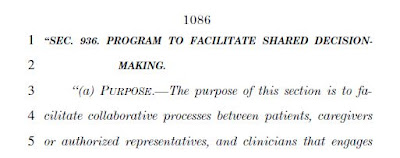 Care Act is Section 3506 on the topic of 'shared decision making.' It's on page 1086 and establishes 'collaborative processes' that 'engage' patients and providers 'with trade-offs among treatment options' with the 'incorporation of patient preferences and values into the medical plan." As the Disease Management Care Blog understands it, this directs the Secretary of HHS to establish standards and decision aids that are used in shared decision making and develop a certification process. Grants are to then be made available to assist providers in using certified shared decision making with the help of 'Shared Decisionmaking Resource Centers.'
Care Act is Section 3506 on the topic of 'shared decision making.' It's on page 1086 and establishes 'collaborative processes' that 'engage' patients and providers 'with trade-offs among treatment options' with the 'incorporation of patient preferences and values into the medical plan." As the Disease Management Care Blog understands it, this directs the Secretary of HHS to establish standards and decision aids that are used in shared decision making and develop a certification process. Grants are to then be made available to assist providers in using certified shared decision making with the help of 'Shared Decisionmaking Resource Centers.'Google the term 'Shared Decision Making" and guess what turns up: Dartmouth Hitchcock Medical Center's Center for Shared Decision Making which is made possible by a grant from the Foundation for Informed Medical Decision Making and Health Dialog, which was built "in collaboration" with the same Foundation to sell programs that reduce the variation described in the Dartmouth Institute and at the Dartmouth Atlas.
The DMCB discerns a pattern here. While the term "shared decision making" is not owned by any particular entity, many of us in the business of population-based care programs associate it with both Dartmouth and Health Dialog. It appears that the newly passed health reform bill is recognizing Dartmouth's extensive work in this area and, indirectly, has also boosted Health Dialog's market presence. Care to guess which institution(s) will be weighing in on the creation of federal standards on shared decision making, helping to promote their use and helping with the Centers?
The DMCB wishes its Senators had written it into Federal law by establishing standards, certification and promotion of policy and health care blogging based on its topics and style. It comforts itself by figuring the Dartmouth and Health Dialog had a head start. The DMCB reminds the spouse that its time will come and, like shared decision making, will not settle for a pilot or a demo. No sir.
To read more on the topic of shared decision making, check out two articles this one and this one from Health Affairs. Based on the statute, looks like we're all going to become more familiar with the concept.





1 comment:
I am unsure how Health Dialog will be able to respond to the demands of Health Care Reform legislation. In the past year this company has been forced to down size and lay off a large percentage of its trained staff due to the economy. Even though Health Dialog is the logical leader in the area of shared decision making with years of experience and success utilizing the Dartmout model, are they positioned to deal with a market that will soon be overwhelmed with 32 million newly insured clients? It is doubtful they will have the resources. Our history of a poor economy in this country has greatly impacted how successful shared decision making will be. It may very well be too little too late and unfortunatey,it is the patient that will pay the ultimate price.
Post a Comment